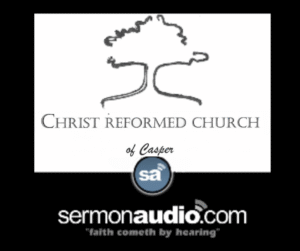LORD’S DAY 25
- Since, then, we are made partakers of Christ and all His benefits by faith only, where does this faith come from?
The Holy Spirit works faith in our hearts1 by the preaching of the Holy Gospel, and confirms it by the use of the holy sacraments.2
[1] Jn. 3:5; *Rom. 10:17. [2] Rom. 4:11; *Acts 8:37.
- What are the sacraments?
The sacraments are visible holy signs and seals appointed by God for this end, that by their use He may the more fully declare and seal to us the promise of the Gospel, namely, that of free grace He grants us the forgiveness of sins and everlasting life for the sake of the one sacrifice of Christ accomplished on the cross.1
1 [1] Gen. 17:11; Rom. 4:11; Deut. 30:6; Heb. 9:8–9; Ezek. 20:12.
- Are both the Word and the sacraments designed to direct our faith to the sacrifice of Christ on the cross as the only ground of our salvation?
Yes, truly, for the Holy Spirit teaches in the Gospel and assures us by the holy sacraments, that our whole salvation stands in the one sacrifice of Christ made for us on the cross.1
[1] Rom. 6:3; *Gal. 3:27; *Heb. 9:12; *Acts 2:41–42.
- How many sacraments has Christ instituted in the New Testament?
Two: Holy Baptism and the Holy Supper.
Means of Grace
Having established the necessity and sufficiency of faith for salvation, the Catechism now turns to the question of how that faith is worked in us. The expression “means of grace” refers to the instruments which God has established to do His work of grace in His people.
God is not bound by the means of grace. He established them; they cannot restrict Him. He can work faith any way He chooses, and He uses a great many means. A sunset, a moral crisis, the death of a loved one or many other events can be an important spur to faith. The means of grace God established, the preaching of the Word and the administration of the sacraments, do bind us. Looking at sunsets is optional in the Christian life. Attending to the preached Word is not.
An active, lively faith in a person is normally connected to the preaching of the Word. People will hear the verbal message of the gospel and believe the propositions contained therein. “Always preach the gospel; if necessary, use words” is a statement attributed (though probably wrongly) to St. Francis of Assisi, and has always been popular with a certain kind of socially active reform-minded Christian, but it is unfortunate nonsense. The gospel is news. It is a verbal message from God to mankind, and without words it cannot be communicated. It is through the foolishness of preaching that God elected to save the world, and we cannot decide we know better than He does.
In addition to the preaching of the message of the gospel, God also instituted sacraments, which are symbols of the message of salvation in visible and tangible form. God commanded us to observe these sacraments. Jesus told His disciples to “do this”, speaking of the Lord’s Supper, until He returned as a remembrance. And when He ascended into heaven He told them to go forward and baptize as a process of making disciples.
As Question 67 makes clear, the sacraments can never function in isolation from the Word. This is one of the main errors of the medieval church with which the Reformation was concerned. The medieval theology focused on the sacraments and viewed them as a channel of grace from God to man, merely by the performance of the act. With the Reformation’s strong focus on the necessity of faith, the sacraments needed to be rethought. Most of the sacraments practiced by the Roman church were discarded as being without Scriptural foundation, and the two that remained, Baptism and the Lord’s Supper, were understood as signs and seals of the gospel. A “sign” is a visible thing which points to some spiritual truth, and a “seal” is a promise, a guarantee. The Catechism will focus on these two aspects of sacraments throughout this section explaining the two sacraments, showing how the sacrament not only displays the nature of the promises of the gospel, illustrating them by the ceremony performed, but also provides the believer with a solemn promise from God, that if the participant in the sacrament truly believes the promise held out in the sacrament, then that participant can have absolute confidence that the thing promised is truly his.
So the sacraments are more than just symbolic portrayals of the gospel, though they are that. They are also powerful means of aiding and strengthening our faith, by re-confirming the promise of the gospel to the believer. They cannot function in isolation from the preached Word, however. Faith is required in order to benefit from the sacraments, and faith comes as a response to the preaching of the Word. One must believe in the promise contained in the sacraments for the sacraments to be of any aid or purpose, and one cannot believe something one does not understand.
If we trust God, then we will lay hold of the instruments He has given us for our salvation, just as Noah’s faith in God’s promise of salvation led him to build the boat that was the instrument of it. Noah’s building the boat to save him from the flood did not indicate any lack of trust in God to save him; not building it would have proved that he did not believe God’s warning or God’s promise, whatever he claimed, since the same God who promised to save him also commanded him to build the boat. Likewise, those who have received the promise of God’s salvation in Christ are going to use the means He has provided to achieve that salvation.


Comments are closed, but trackbacks and pingbacks are open.